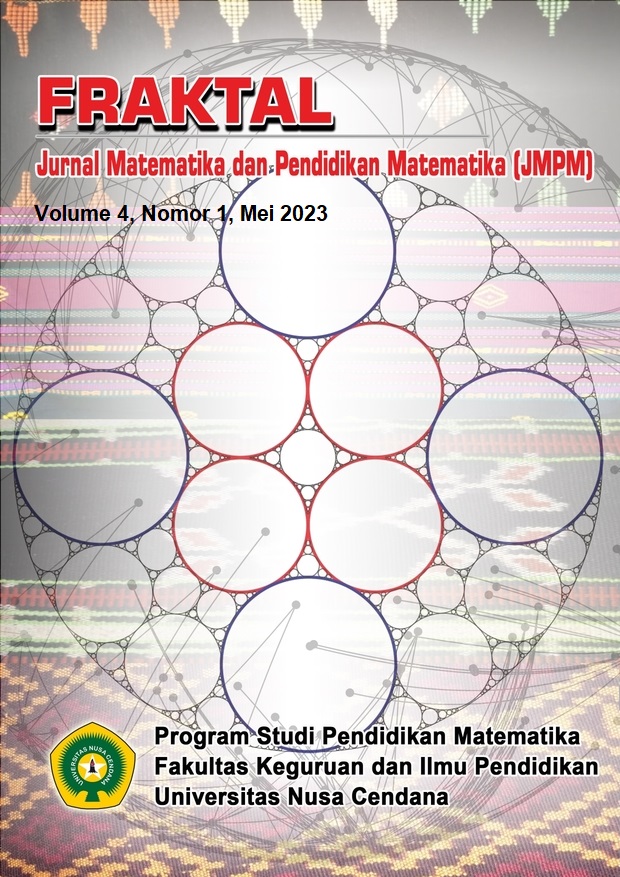Karakteristik Pemecahan Masalah Matematika Siswa dalam Menyelesaikan Masalah Berpikir Aljabar ditinjau dari Jenjang Sekolah
Abstract
Facts on the field show that there are still many students who have low abilities in solving mathematical problems. One of the factors that influence this is because students are not accustomed to practicing solving math problems in class. The questions given to students were only questions that put more emphasis on carrying out procedures and calculations. The research was carried out to obtain an overview of students' mathematical problem solving abilities. The research in question was carried out at the end of elementary school level and at the beginning of junior high school level. It is hoped that the results of this research can be used as material for consideration and input for improvements and changes in the learning process to improve students' mathematical problem solving abilities. This study uses a qualitative approach. While this type of research is a phenomenological study. Phenomenology is a study that describes what a person receives, feels and knows in his consciousness about the experiences he has experienced. And what emerges from that awareness is called a phenomenon. The subjects of this study were students of class VI elementary school and class VII junior high school. Based on the results of the research and discussion, it can be concluded that there are similarities and differences in the characteristics of problem solving abilities between students at the final level of the elementary school level and students at the initial level of the junior high school level.
Downloads
References
Hidayanto, E. (2013). Proses Berpikir Aritmatika dan Berpikir Aljabar dalam Menyelesaikan Soal Cerita. Prosiding Seminar Nasional Aljabar Dan Pembelajarannya, UM, 173–177
Intaros, P., Inprasitha, M., & Srisawadi, N. (2014). Students ’ problem solving strategies in problem solving - mathematics classroom. Procedia - Social and Behavioral Sciences, 116, 4119–4123. https://doi.org/10.1016/j.sbspro.2014.01.901
Kieran, C. (2004). Algebraic Thinking in the Early Grades : What Is It?. Mathematics Educator, 8(1), 139–151. https://doi.org/10.1080/13670050.2017.1323445
Kieran, C., Pang, J., Schifter, D., & Ng, S. F. (2016). Early Algebra, (March). https://doi.org/10.1007/978-3-319-32258-2
Kriegler, B. S. (1999). Just what is algebraic thinking ? California math council comunicator, 23(3), 32–35
Lenchner, G. (2005). Creative Problem Solving in School Mathematics. New South Wales: National Library of Australia
Nada, Y. H. et al. (2020). Characteristics of students ’ mathematical representation in solving algebraic thinking problems Characteristics of students ’ mathematical representation in solving algebraic thinking problems. Jurnal of Physics Conference Series. 1521, 6. https://doi.org/10.1088/1742-6596/1521/3/032009
Nurfitriyanti, M. (2016). Model Pembelajaran Project Based Learning Terhadap Kemampuan Pemecahan Masalah Matematika. Jurnal Formatif, 6(2), 149–160.
Polya, G. (1945). How to Solve it: a new aspect of mathematical method (2nd ed.). Princeton: Princeton University Press
Radford, L. (2018). The Emergence of Symbolic Algebraic Thinking in Primary School. Published In: C. Kieran (Ed.), Teaching and Learning Algebraic Thinking with 5- to 12- Year-Olds: The Global Evolution of an Emerging Field of Research and Practice (Pp. 3-25). New York: Springer., (January). https://doi.org/10.1007/978-3-319-68351-5
Samo, D. D., & Kartasasmita, B. (2017). Developing Contextual Mathematical Thinking Learning Model to Enhance Higher-Order Thinking Ability for Middle School Students. International Education Studies, 10(12), 17–29. https://doi.org/10.5539/ies.v10n12p17
Seeley, C. L. (2004). President ’ s Message A Journey in Algebraic Thinking. NCTM News Bulletin, (September), 2004
Sulak, S. (2010). Effect of problem solving strategies on problem solving achievement in primary school mathematics. Procedia - Social and Behavioral Sciences, 9, 468–472. https://doi.org/10.1016/j.sbspro.2010.12.182
Sumartini, T. S. (2016). Peningkatan Kemampuan Pemecahan Masalah Matematis Siswa melalui Pembelajaran Berbasis Masalah. Jurnal Pendidikan Matematika STKIP Garut, 5, 148–158.
Woolley, K. E., Huang, T., & Rabinowitz, M. (2019). The effects of knowledge , strategies , and the interaction between the two in verbal analogy problem solving. Contemporary Educational Psychology, 56(December 2018), 91–105. https://doi.org/10.1016/j.cedpsych.2018.12.003
Copyright (c) 2023 FRAKTAL: JURNAL MATEMATIKA DAN PENDIDIKAN MATEMATIKA

This work is licensed under a Creative Commons Attribution-NonCommercial-ShareAlike 4.0 International License.
- Hak publikasi atas semua materi naskah jurnal yang diterbitkan/dipublikasikan dalam situs E-Journal Fraktal ini dipegang oleh dewan redaksi dengan sepengetahuan penulis (hak moral tetap milik penulis naskah).
- Ketentuan legal formal untuk akses artikel digital jurnal elektronik ini tunduk pada ketentuan lisensi Creative Commons Attribution-ShareAlike (CC BY-SA), yang berarti Jurnal Fraktal berhak menyimpan, mengalih media/format-kan, mengelola dalam bentuk pangkalan data (database), merawat, dan mempublikasikan artikel tanpa meminta izin dari Penulis selama tetap mencantumkan nama Penulis sebagai pemilik Hak Cipta.
- Naskah yang diterbitkan/dipublikasikan secara cetak dan elektronik bersifat open access untuk tujuan pendidikan, penelitian, dan perpustakaan. Selain tujuan tersebut, dewan redaksi tidak bertanggung jawab atas pelanggaran terhadap hukum hak cipta.

 Yohanes Hariaman Nada(1*)
Yohanes Hariaman Nada(1*)










